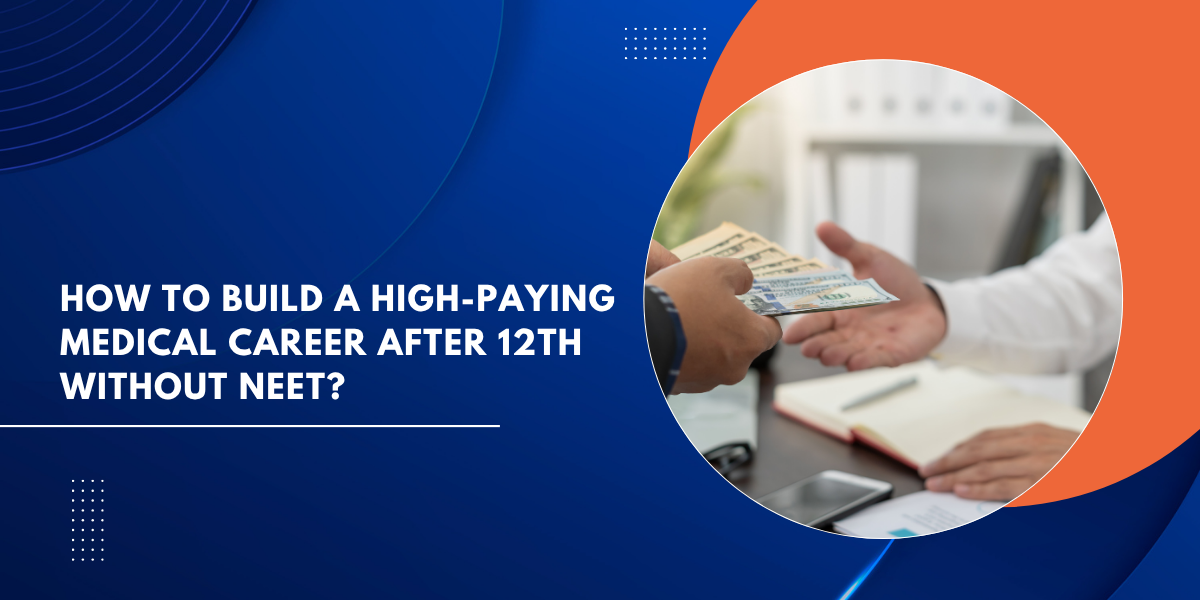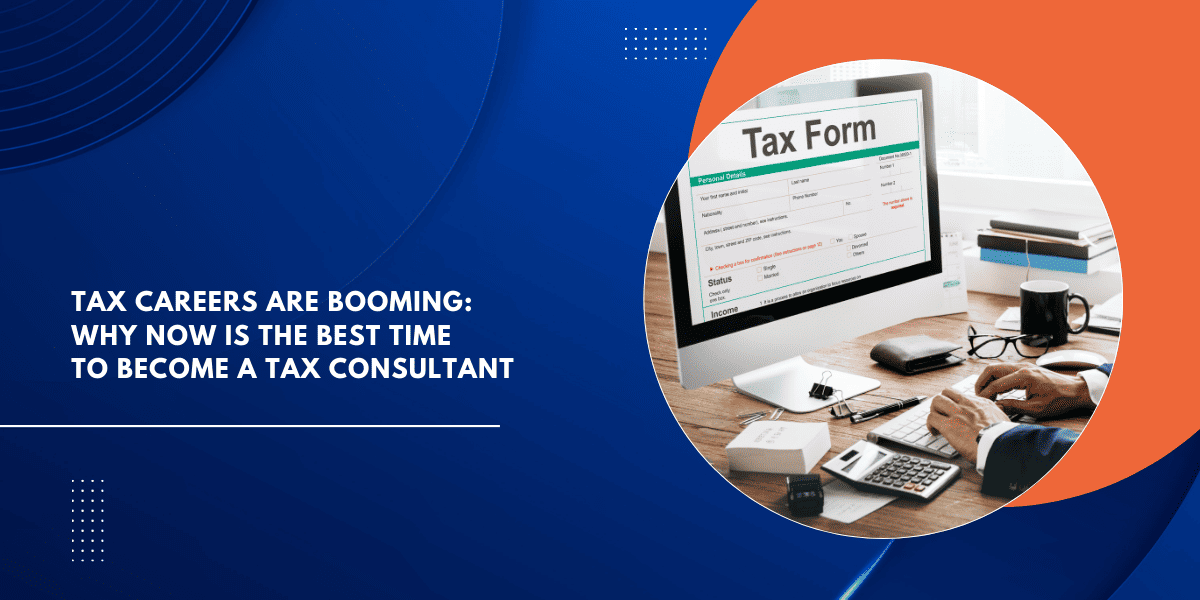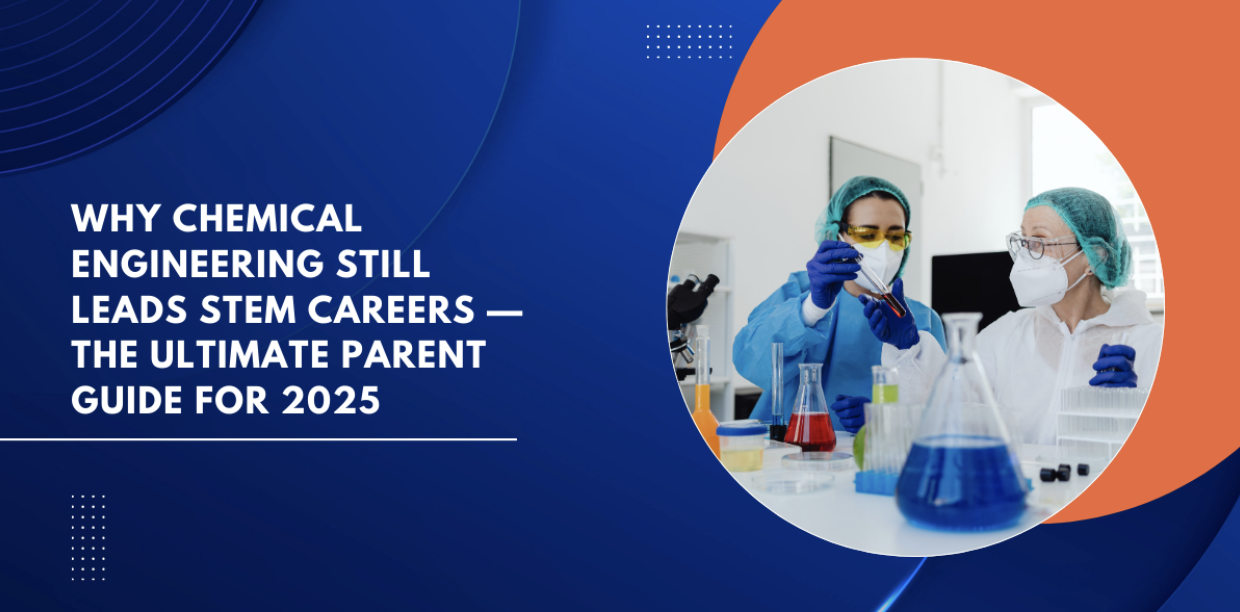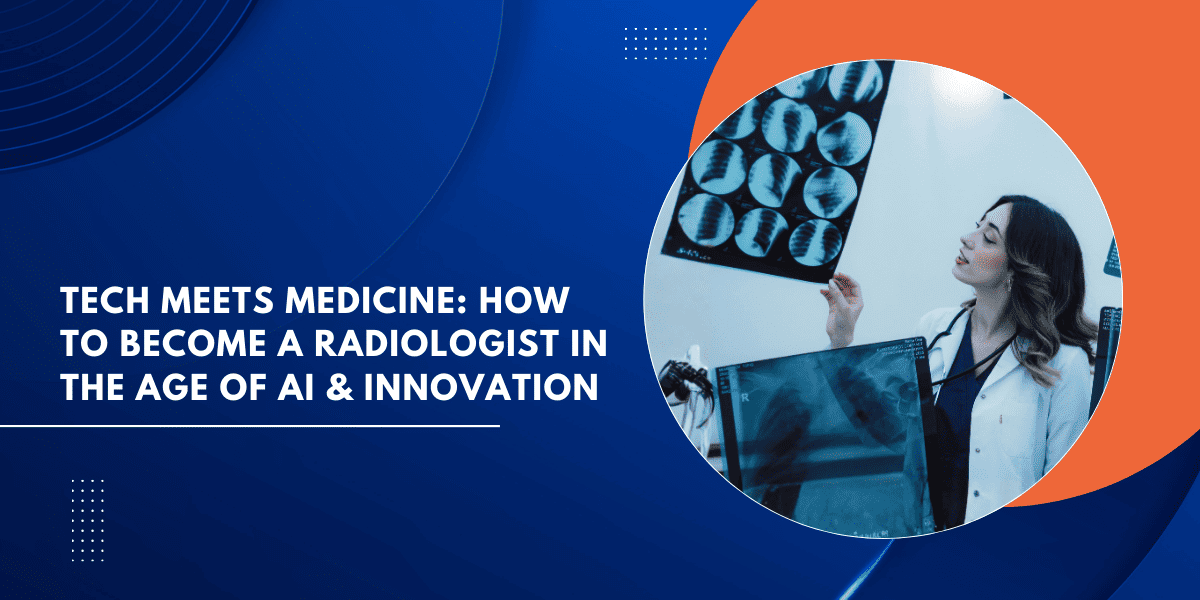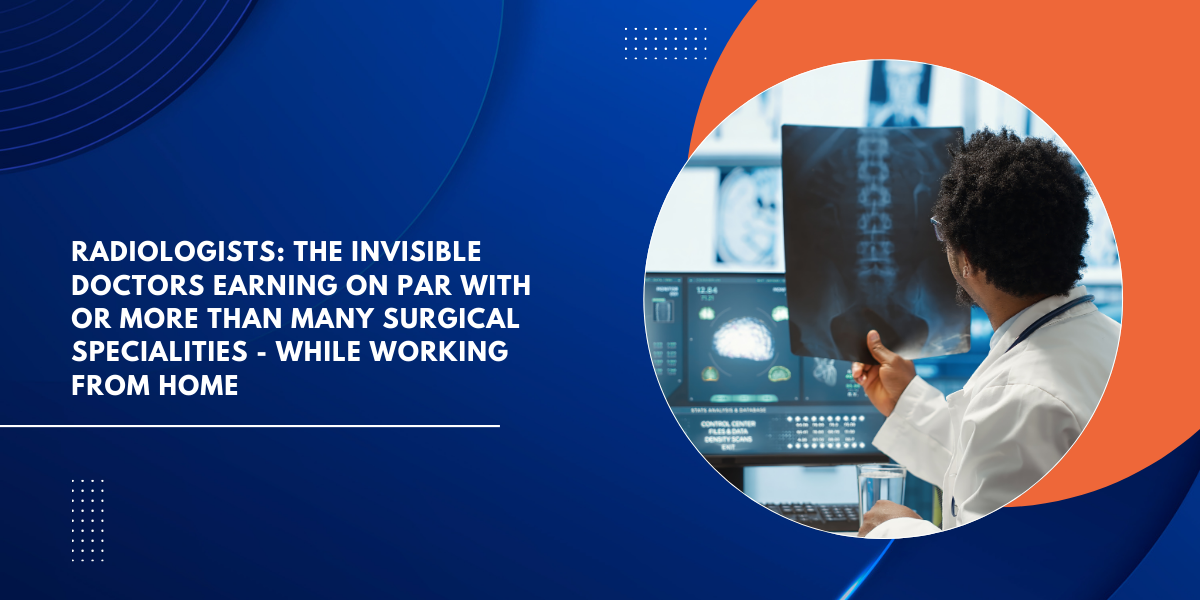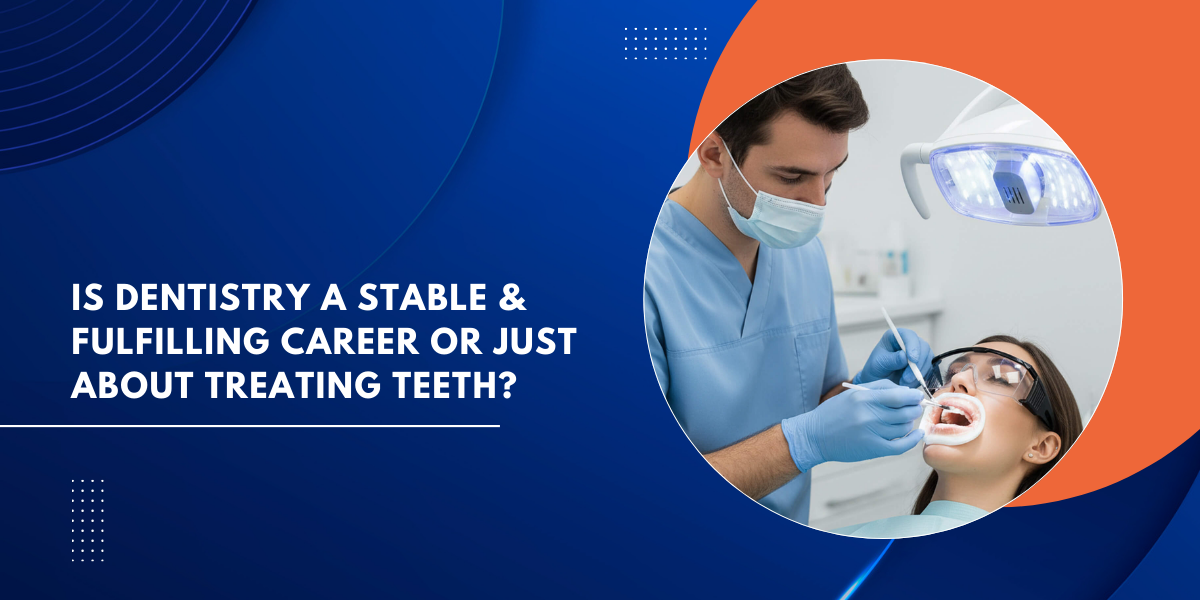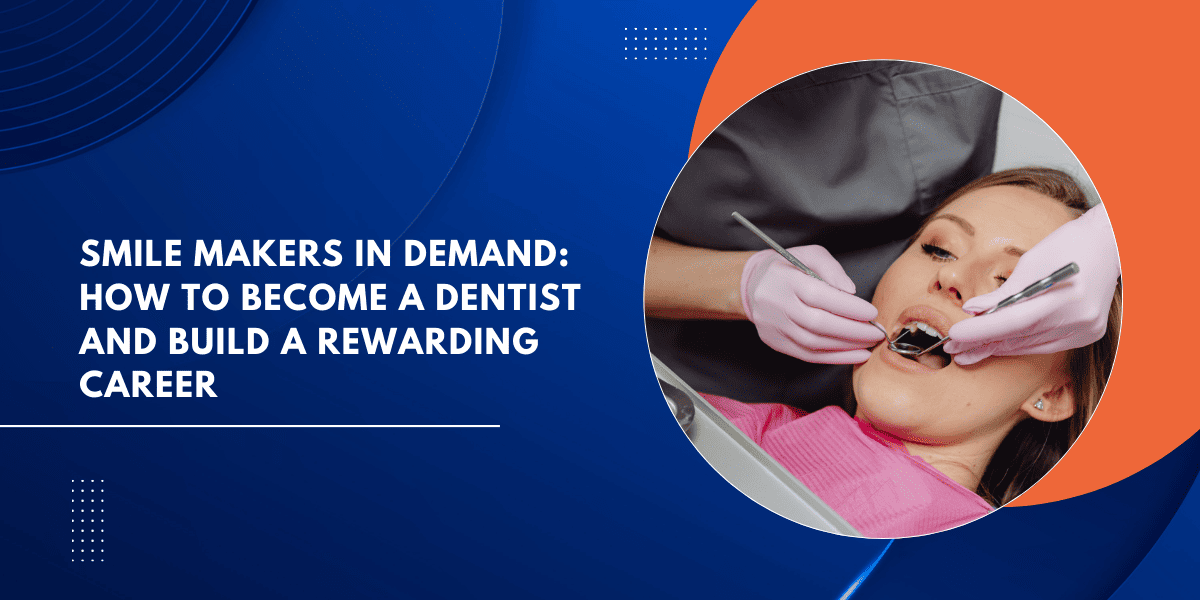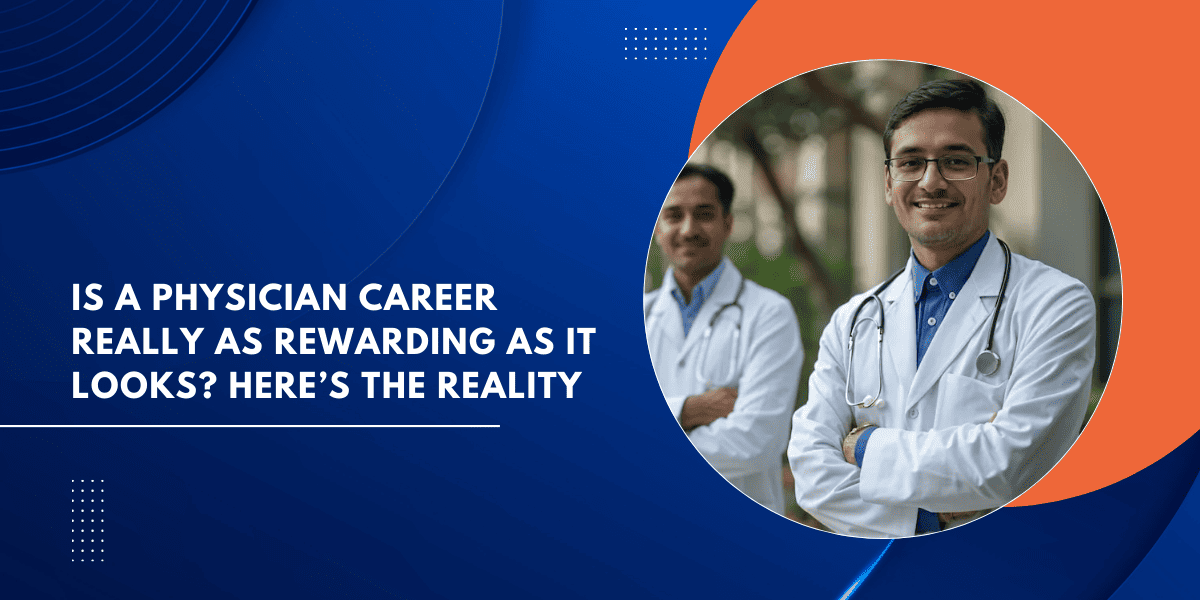Blog written by Indu R Eswarappa, Career Coach & Education Change-Maker
Introduction to the Career
When Priya scored 92% in her Class 12 board exams, her dream was to enter the medical field. But despite her hard work, NEET didn’t go as expected. For weeks, she believed her only option was to give up on her medical career. But what she didn’t know is that some of the highest-paying, respected careers in healthcare don’t require NEET at all.
Over the years, I’ve met countless students like Priya. And from what I’ve seen, the medical field is much broader than most people realise. It’s not just about becoming a doctor. There are so many rewarding paths where you can build a successful, high-paying medical career — without going through NEET.
In this guide, I’ll walk you through the practical, real-world career options available after Class 12 that can lead you into the medical world without NEET.
Let’s dive in.
Medical Career without NEET: What Does It Mean?
When I say “medical career without NEET,” I’m not talking about paramedical courses like nursing, radiology, or lab technician roles. Those are valuable too, but today, I want to highlight paths beyond the usual paramedical stream.
Think of fields where you’re still connected to healthcare, medicine, wellness, but you don’t need a NEET score to get there.
I’ve seen students land in pharmaceutical companies, hospitals, research labs, healthcare startups, and even top-paying jobs in healthcare IT, all without NEET.
Let’s break it down for you!
Key Responsibilities & Work Environment Across Medical Careers Without NEET
When students ask me what kind of work they can actually do in the medical field without cracking NEET, I often smile and say, “It’s so much more than just lab coats and hospitals.”
Over the years, I’ve seen how these careers take you into research labs, wellness centers, tech startups, and much more.
1. Bachelor of Pharmacy (B.Pharm)
What is B.Pharma?
It’s a 4-year undergraduate program where you learn everything about medicines — how they’re made, how they work, how they’re tested, and how they reach patients safely. You’ll study subjects like pharmacology, medicinal chemistry, and drug development.
Career Options After B.Pharma:
✅ Drug Research & Development
✅ Pharmaceutical Sales & Marketing (with good incentives!)
✅ Quality Control & Manufacturing
✅ Clinical Research
✅ Pharmacovigilance (drug safety monitoring)
✅ Even government sector jobs in drug control organizations
Work Environment:
Pharmacy graduates work in pharmaceutical companies, research labs, drug regulatory departments, or even as medical representatives. Some pursue higher studies or certifications for specialised roles in drug formulation or clinical trials.
2. Bachelor of Science (B.Sc) in Biotechnology
What is B.Sc Biotechnology?
It’s a 3-year program where biology meets technology. You’ll explore how living organisms are used to develop medicines, vaccines, and new healthcare solutions. Subjects include genetics, molecular biology, and microbiology. Many colleges offer it as a four-year undergraduate program divided into eight semesters with plenty of practical works and theory classes as well.
Career Options After B.Sc Biotechnology:
✅ Research Scientist in Biotech & Pharma Companies
✅ Clinical Research Associate
✅ Biotech Product Development
✅ Quality Control & Testing Labs
✅ Genetic Testing Labs
✅ Further study options like M.Sc or MBA to boost your earning potential
Work Environment:
Biotech professionals often work in research labs, biotech firms, pharmaceutical companies, or healthcare startups, contributing to innovation in medicine, agriculture, and genetic research.
3. Bachelor of Science (B.Sc) in Clinical Psychology
What is B.Sc Clinical Psychology?
It’s a 3-year undergraduate program focused on understanding human behavior, mental health disorders, and therapy techniques. You’ll study cognitive psychology, abnormal psychology, and therapeutic approaches.
Career Options After B.Sc Clinical Psychology:
✅ Hospitals & Mental Health Clinics
✅ Rehabilitation Centers
✅ Corporate Wellness Programs
✅ Schools & Educational Institutions
✅ Private Practice (with further studies like M.Sc & certifications)
Work Environment:
Psychologists work in hospitals, private counseling centers, rehabilitation facilities, schools, and wellness companies. With experience and specialisation, private practice is a popular, high-paying option.
4. Bachelor of Science (B.Sc) in Nutrition & Dietetics
What is B.Sc Nutrition & Dietetics?
A 3-year course focusing on the science of food, nutrition, and diet planning. You’ll learn how food impacts health and how to create personalized nutrition plans for individuals and communities.
Career Options After B.Sc Nutrition & Dietetics:
✅ Clinical Dietitian in Hospitals
✅ Sports & Fitness Nutritionist
✅ Corporate Wellness Consultant
✅ Food Product Development
✅ Health Coaching & Private Practice
Work Environment:
Nutrition experts work in hospitals, sports centers, wellness clinics, and fitness brands. Many also build successful private practices or work as consultants for health and nutrition programs.
5. Bachelor of Science (B.Sc) in Biomedical Science
What is B.Sc Biomedical Science?
A 3-year program that combines biology and medicine. You’ll study how diseases develop, how they’re diagnosed, and how new treatments are researched. Core subjects include pathology, microbiology, genetics, and immunology.
Career Options After B.Sc Biomedical Science:
✅ Research Labs & Medical Institutes
✅ Diagnostic Laboratories
✅ Pharmaceutical Companies
✅ Clinical Trials & Research Studies
✅ Medical Equipment Companies
Work Environment:
Biomedical scientists work in cutting-edge labs, hospitals, research centers, and diagnostic companies — playing a crucial role in medical advancements and disease prevention.
6. Bachelor of Occupational Therapy (BOT)
What is BOT?
A 4.5-year undergraduate program (including internship) that trains you to help individuals with injuries, illnesses, or disabilities regain independence through therapeutic activities.
Career Options After BOT:
✅ Rehabilitation Centers
✅ Pediatric Therapy Clinics
✅ Hospitals & Nursing Homes
✅ Mental Health Facilities
✅ Private OT Practice
Work Environment:
Occupational Therapists work in hospitals, therapy centers, elder care homes, and special education schools. Some also build private practices, helping clients live fuller, independent lives.
7. B.Sc in Medical Laboratory Technology (MLT)
What is B.Sc MLT?
A 3-year course that trains you to perform diagnostic tests, operate medical equipment, and assist doctors in identifying diseases through lab work.
Career Options After B.Sc MLT:
✅ Diagnostic Labs
✅ Hospital Laboratories
✅ Research Facilities
✅ Pharmaceutical Companies
✅ Public Health Organizations
Work Environment:
MLT professionals are essential members of diagnostic teams, working in hospital labs, independent testing centers, research labs, and pharmaceutical companies.
8. B.Sc in Genetics
What is B.Sc Genetics?
A 3-year program exploring how genes affect health, disease, and treatment. You’ll learn about human genetics, molecular biology, and genetic engineering.
Career Options After B.Sc Genetics:
✅ Genetic Testing Labs
✅ Research Organizations
✅ Healthcare Startups in Genomics
✅ Pharma & Biotech Firms
✅ Genetic Counseling (with further studies)
Work Environment:
Genetics graduates work in advanced laboratories, research institutions, diagnostic centers, or healthcare startups focused on personalised medicine and genetic research.
9. B.Sc in Forensic Science
What is B.Sc Forensic Science?
A 3-year undergraduate course focusing on applying science to crime investigation. You’ll study forensic biology, toxicology, crime scene analysis, and legal procedures.
Career Options After B.Sc Forensic Science:
✅ Forensic Laboratories
✅ Crime Investigation Departments
✅ Law Enforcement Agencies
✅ Legal Consultancies
✅ Private Forensic Firms
Work Environment:
Forensic experts work with law enforcement, legal authorities, and private investigation firms — using scientific techniques to solve crimes and uphold justice.
Where Can These Careers Take You?
One of the best things about building a medical career without NEET is the variety of spaces you can work in. Gone are the days when healthcare only meant hospitals. Today, healthcare professionals — whether in pharmacy, biotechnology, psychology, or even forensic science — are shaping the future of health from labs, startups, schools, and beyond.
Depending on your interests and the path you choose, these careers can take you to:
Pharmaceutical Companies & Research Labs
If you pursue B.Pharm or Biotechnology, you might find yourself working in bustling pharmaceutical companies, drug manufacturing units, or research labs — developing life-saving medicines, improving drug quality, or even leading clinical trials.
Hospitals, Clinics & Rehabilitation Centers
Fields like Clinical Psychology, Nutrition & Dietetics, Biomedical Science, Occupational Therapy, and MLT open doors to hospitals, clinics, and rehabilitation centers. You’ll work alongside doctors, supporting patients with everything from mental health to diagnostics to physical recovery.
Healthcare Startups & Health Tech Companies
From my experience, students exploring Biotechnology, Genetics, or Healthcare IT often land in innovative healthcare startups. These companies work on digital health records, genetic testing, personalised medicine, or healthcare apps — blending technology with medical expertise.
Schools, Wellness Centers & Corporate Health Programs
Nutritionists, psychologists, and occupational therapists are increasingly working with schools, fitness brands, wellness centers, and corporate wellness programs — helping individuals lead healthier, more balanced lives.
Diagnostic Labs & Testing Facilities
If you enjoy lab work, Biomedical Science, MLT, and Genetics can lead you into diagnostic laboratories, pathology labs, and research facilities — playing a crucial role in disease detection and prevention.
Law Enforcement, Crime Labs & Legal Consultancies
For those drawn to Forensic Science, your workplace might look very different — think crime investigation departments, forensic labs, or legal teams working to solve real-world cases using scientific evidence.
Private Practice & Entrepreneurial Ventures
Many graduates in Psychology, Nutrition, Occupational Therapy, and even Forensic Science choose to start their own practices or consultancies. With the right expertise and reputation, private practice offers flexibility and excellent earning potential.
Educational Pathways & Required Qualifications
When students (and let’s be honest, worried parents) ask me, “Can you really have a medical career without NEET?”, I always tell them — absolutely yes. But like any meaningful profession, it starts with choosing the right academic path. The best part? Many of these careers have well-defined, structured programs that set you up for success — no NEET, no confusion.
Here’s a simple breakdown of the typical educational routes for these non-NEET medical careers, along with a few tips I often share with students based on what I’ve seen over the years:
Bachelor of Pharmacy (B.Pharm) – 4 Years
This is your entry ticket into the booming pharmaceutical world. The program covers drug development, pharmacology, and medicinal chemistry. It also includes practical lab training to prepare you for real-world pharma roles.
Tip: Always check if your college is PCI (Pharmacy Council of India) approved. Top institutes often have tie-ups with pharma companies for internships — a big plus for your future job prospects.
B.Sc in Biotechnology – 3 Years
For students fascinated by science and innovation, this degree offers the perfect blend of biology and technology. You’ll study genetics, microbiology, molecular biology, and more.
Tip: If possible, aim for institutes that offer hands-on research opportunities. It looks great on your resume and gives you real exposure to cutting-edge biotech work.
B.Sc in Clinical Psychology – 3 Years
If mental health interests you, this degree lays the foundation. You’ll learn about human behavior, therapy approaches, and mental health challenges.
Tip: Look for colleges with strong internship programs in hospitals or mental health centers. Real-world experience is a game-changer in psychology.
B.Sc in Nutrition & Dietetics – 3 Years
Want to help people lead healthier lives through food? This course teaches you the science behind nutrition, diet planning, and health management.
Tip: After your degree, consider doing short-term certifications in sports nutrition, diabetes management, or weight loss coaching — these specialisations boost your income potential.
B.Sc in Biomedical Science – 3 Years
If you love lab work and medical research, this is your path. You’ll dive deep into human biology, pathology, microbiology, and disease research.
Tip: Many students choose to pursue an M.Sc after this to access higher-level research or diagnostic roles — something to plan for early on.
Bachelor of Occupational Therapy (BOT) – 4.5 Years
This course teaches you to help people regain independence after injury, illness, or disability. It includes both classroom learning and a compulsory internship.
Tip: Look for BOT programs approved by the respective medical councils. And during internships, try working with different age groups — children, adults, elderly — to find your area of interest.
B.Sc in Medical Laboratory Technology (MLT) – 3 Years
Want to be the person behind accurate medical diagnoses? This course trains you to perform lab tests, handle equipment, and interpret results.
Tip: Internships in reputed diagnostic labs can set your career on the right track. Practical experience matters hugely in this field.
B.Sc in Genetics – 3 Years
This degree explores human genetics, DNA, hereditary diseases, and more. With genetics shaping the future of medicine, this is a smart long-term choice.
Tip: Consider pursuing a Master’s degree in Genetics or Genetic Counseling if you want to specialise and increase your earning potential.
B.Sc in Forensic Science – 3 Years
For those curious about crime-solving through science, this course teaches forensic biology, toxicology, crime scene investigation, and more.
Tip: After your degree, specialised forensic certifications or postgraduate studies can open doors to higher-ranking, better-paying roles.
What About Entrance Exams?
The good news? For most of these programs, you don’t need to appear for NEET. However, many reputed universities and institutes conduct their own entrance exams or admission tests.
These usually assess your knowledge in science subjects like Biology, Chemistry, Physics — and your logical reasoning.
A Quick Example:
For B.Pharm, Biotechnology, or Nutrition programs, universities may conduct entrance tests like CUET, state-level CETs, or institute-specific exams.
My Suggestion:
Always check the admission requirements of your shortlisted colleges early. Being prepared — especially for entrance exams, interviews, or eligibility tests — gives you an edge.
Necessary Soft Skills and Technical Abilities
Whenever I guide students exploring medical careers beyond NEET, I always remind them — healthcare isn’t just about textbooks and technical knowledge. The most successful professionals I’ve seen in these fields combine sharp scientific understanding with compassion, communication, and problem-solving.
Whether you’re working in a lab, a wellness center, or a high-tech healthcare startup, your personal and professional skills will shape your success.
Let’s break down the essential abilities you’ll need to thrive:
Soft Skills – The Human Side of Healthcare
Empathy and Compassion
Healthcare is, at its core, about improving lives. Whether you’re helping a patient recover through occupational therapy or guiding someone through mental health challenges, empathy helps you connect — and keeps your work meaningful.
Communication Skills
You’ll often be explaining complex health information — to patients, families, or even colleagues from non-medical backgrounds. The ability to break things down simply and clearly is invaluable.
Patience and Attention to Detail
Lab tests, patient care, research — these processes require careful observation and a calm, meticulous approach. Progress can be slow or unpredictable, so patience is your friend.
Adaptability
From biotech to clinical psychology to health IT — no two days look alike. You might work with different age groups, technologies, or health conditions. Being flexible helps you navigate this variety.
Teamwork and Collaboration
Healthcare is never a solo act. You’ll work alongside doctors, therapists, lab technicians, IT experts, or researchers. The ability to collaborate smoothly in multidisciplinary teams makes all the difference.
Technical Abilities – The Science and Systems That Power These Careers
Subject-Specific Knowledge
- Pharmacy: Drug formulation, pharmacology, regulatory standards
- Biotechnology: Genetics, microbiology, lab techniques
- Clinical Psychology: Behavioral assessment, therapeutic approaches
- Nutrition & Dietetics: Diet planning, health risk analysis
- Biomedical Science: Disease pathology, laboratory diagnostics
- Occupational Therapy: Rehabilitation techniques, assistive devices
- MLT: Lab equipment handling, diagnostic testing
- Genetics: DNA testing, genetic counseling basics
- Healthcare IT: Electronic health records, health data management
- Forensic Science: Crime scene analysis, evidence handling
Technology Familiarity
Across these careers, staying updated on tools and software is key. From lab equipment to data management systems to therapy apps — technology makes your work more effective and efficient.
Problem-Solving Skills
Whether it’s diagnosing a lab error, customizing a diet plan, or interpreting genetic results — critical thinking helps you find solutions quickly and responsibly.
Documentation and Reporting
Accurate records, reports, and health data management are crucial. Good documentation isn’t just about organization — it ensures patient safety, legal compliance, and smooth teamwork.
My Advice:
“If you love science but also want to interact with people, solve real-world problems, and see the impact of your work — these careers let you do all of that. Build your skill set with care. A strong mix of knowledge, compassion, and technical ability is what makes you stand out — no NEET required.”

Career Progression & Growth Opportunities
Whenever I speak to students considering medical careers beyond NEET, one question always comes up: “What’s next after I complete my degree?” And honestly — that’s where these careers get exciting. They’re not one-dimensional. Whether you see yourself climbing the ladder to leadership or diving deep into a specialist role, there’s plenty of room to grow.
Let me walk you through how the journey typically unfolds across these in-demand healthcare paths:
Entry-Level: Building the Foundations
After your degree — whether it’s Pharmacy, Biotechnology, Psychology, Nutrition, or any of the others we discussed — you’ll likely start in roles such as:
✅ Junior Pharmacist or Medical Representative (B.Pharm)
✅ Research Assistant or Lab Technician (Biotech, Biomedical Science, Genetics)
✅ Dietitian, Psychologist, or Occupational Therapist (with required certifications)
✅ Medical Lab Technician or Diagnostic Assistant (MLT)
✅ Health IT Support or Data Associate (Healthcare IT)
✅ Forensic Lab Assistant or Crime Scene Technician (Forensic Science)
This stage is all about gaining hands-on experience, understanding real-world challenges, and building your confidence. The more diverse your exposure, the better prepared you’ll be for growth.
Mid-Level: Taking Charge of Your Career
With a few years of experience, you’ll naturally move into higher-responsibility roles such as:
✅ Clinical Research Associate or Quality Control Lead (Biotech, Biomedical Science)
✅ Senior Pharmacist or Regulatory Affairs Executive (Pharmacy)
✅ Lead Dietitian, Psychologist, or Occupational Therapy Coordinator
✅ Lab Supervisor or Diagnostic Lab Manager (MLT)
✅ Health IT Analyst or Project Manager (Healthcare IT)
✅ Forensic Expert or Senior Crime Scene Investigator
At this stage, you’ll often mentor juniors, lead small teams, or contribute to policy-making and healthcare process improvement.
Advanced: Becoming a Specialist or Leader
As you gain expertise, doors open for you to specialise, lead, or even branch out independently:
✅ Start your own Pharmacy, Nutrition, Psychology, or Occupational Therapy practice
✅ Work in senior research, product development, or regulatory leadership in pharma or biotech firms
✅ Join academic institutions as a lecturer, trainer, or researcher
✅ Become a healthcare consultant or advisor for hospitals, startups, or government bodies
✅ Move into policy, strategy, or healthcare management roles
Many professionals also explore international opportunities — especially in fields like Genetics, Biotechnology, Nutrition, and Occupational Therapy — where global demand is growing rapidly.

Specialisations: Finding Your Niche
Once you’ve built a strong foundation, specialisation helps you stand out — and often, earn more. Popular high-growth niches include:
✅ Clinical Trials & Pharmacovigilance (B.Pharm, Biotech)
✅ Genetic Counseling or Genomic Research (Genetics)
✅ Pediatric Nutrition, Sports Nutrition (Nutrition & Dietetics)
✅ Neuropsychology, Child Psychology (Clinical Psychology)
✅ Advanced Lab Diagnostics or Molecular Testing (MLT, Biomedical Science)
✅ Digital Health Product Development (Healthcare IT)
✅ Forensic Toxicology or Cyber Forensics (Forensic Science)
The best part? These niches allow you to align your work with your passions — whether it’s science, technology, mental health, or research.
Pro Tip:
“Don’t feel pressured to have it all figured out on Day 1. The beauty of these careers is that they grow with you. Start with curiosity, stay consistent, and as your skills develop, you’ll discover doors opening — sometimes in places you never imagined.”
Return on Investment (ROI): Is It Worth Pursuing Medical Career without NEET?
Here’s something I always tell students — you don’t need NEET to have a high-paying medical career. Many of these fields offer excellent earning potential, especially with the right specialisation or international exposure.
The medical world is vast. And the Return on Investment (ROI) for non-NEET medical careers is surprisingly good — offering respectable jobs, strong salary growth, and global opportunities, all without the stress (and expense) of MBBS.
Lower Education Costs, Faster Entry into Healthcare
Unlike MBBS or other medical degrees that stretch over 6–8 years with heavy fees, most of these non-NEET healthcare programs are budget-friendly and career-focused.
Bachelor’s programs like B.Pharm, Biotechnology, Nutrition, Psychology, MLT, and others typically cost:
✅ ₹2–5 lakhs in government colleges
✅ ₹5–12 lakhs in private institutes
And within 3–4.5 years, you’re job-ready — a much faster, more affordable pathway compared to traditional medical routes.
Attractive Starting Salaries
Fresh graduates from these fields can expect solid starting packages, especially in high-demand areas like Biotechnology, Healthcare IT, Nutrition, and Private Practice.
💡 Typical starting salaries:
✅ ₹3–6 LPA for most entry-level roles
✅ ₹4–8 LPA for healthcare tech, pharma sales, or specialised nutrition roles
Quick Career Progression
With just 2–3 years of experience or additional certifications (like M.Sc, health coaching, or lab specialisations), many professionals double their income. It’s common to see salaries in the ₹8–15 LPA range within a few years — especially for those working in research, diagnostics, healthcare startups, or international companies.
Global Demand & Flexibility
If you dream of working abroad, fields like Biotechnology, Genetics, Nutrition, and Occupational Therapy are growing fast worldwide. Many Indian graduates pursue advanced studies or work opportunities overseas — significantly boosting both income and career growth.
Average Salary Range (India)
Role | Monthly Salary (Approx) |
Entry-Level (Pharmacy, Biotech, MLT, Nutrition, etc.) | ₹25,000 – ₹40,000 |
Mid-Level Specialist or Team Lead | ₹40,000 – ₹75,000 |
Private Practice (Dietitian, Psychologist, OT, etc.) | ₹70,000 – ₹1.5 lakh+ |
Senior Roles/International Opportunities | ₹2 – ₹6 lakhs/month (varies by field & location) |
ROT: Is the Time You Invest Worth It?
Now let’s talk about the other side of the coin — Return on Time (ROT). Because building a medical career without NEET isn’t just about money — it’s about how quickly you can start making an impact and earning a good living.
A lot of students ask me: “If I choose one of these medical fields, how long before I actually start working and earning?” And my answer is: Sooner than you might think.
Here’s why it offers a strong ROT:
Time Span: 3–5 Years — You’re Career-Ready, Fast
Most of these healthcare programs — whether it’s Pharmacy, Biotechnology, Nutrition, Psychology, or MLT — get you job-ready within 3 to 4.5 years. Some even allow you to start earning during internships or right after basic training.
No Wasted Time — Every Year Adds to Your Future
Even if you choose to do optional specialisations or certifications, they directly boost your salary potential and open niche job roles. Nothing goes to waste — it’s all adding real value to your future career.
Early Earning Advantage
By the time you complete your degree and short-term training, you can start earning — often within 3 to 5 years. Compared to MBBS or other long academic routes, you’re ahead of the game.
Continuous Growth & Flexibility
With healthcare evolving fast, there’s always room to specialise further, upskill, or shift into high-demand areas like Healthcare IT, Private Practice, or Research. And the best part? You don’t have to wait a decade to do that.
In Just 3–5 Years, You’re Ready to Step Into the Medical World and Start Earning — No NEET Required.
Final Takeaway: Who Should Consider These Careers?
If you’ve always dreamed of being part of the medical world but feel that NEET isn’t your only—or best—option, these careers might just be the path you’ve been looking for. From what I’ve seen, students who choose these fields often discover a fulfilling, well-paying, and respected place in healthcare — without the stress and uncertainty of traditional NEET routes.
These careers are ideal for students who:
✅ Come from a Science background (PCB or relevant streams)
✅ Are passionate about health, science, and improving lives
✅ Prefer practical, real-world roles over long academic delays
✅ Value flexibility — with options to specialise, work abroad, or start their own practice
✅ Are open to continuous learning and upskilling to stay relevant
My honest advice?
If you’re curious, hardworking, and ready to explore the many faces of modern healthcare, there’s a space for you — no NEET score required. The future of healthcare needs not just doctors, but scientists, therapists, technologists, and innovators. You could be one of them.
References and Resources:
Coursera – Healthcare IT & Related Programs
Biotech Industry Outlook – India Brand Equity Foundation (IBEF)

